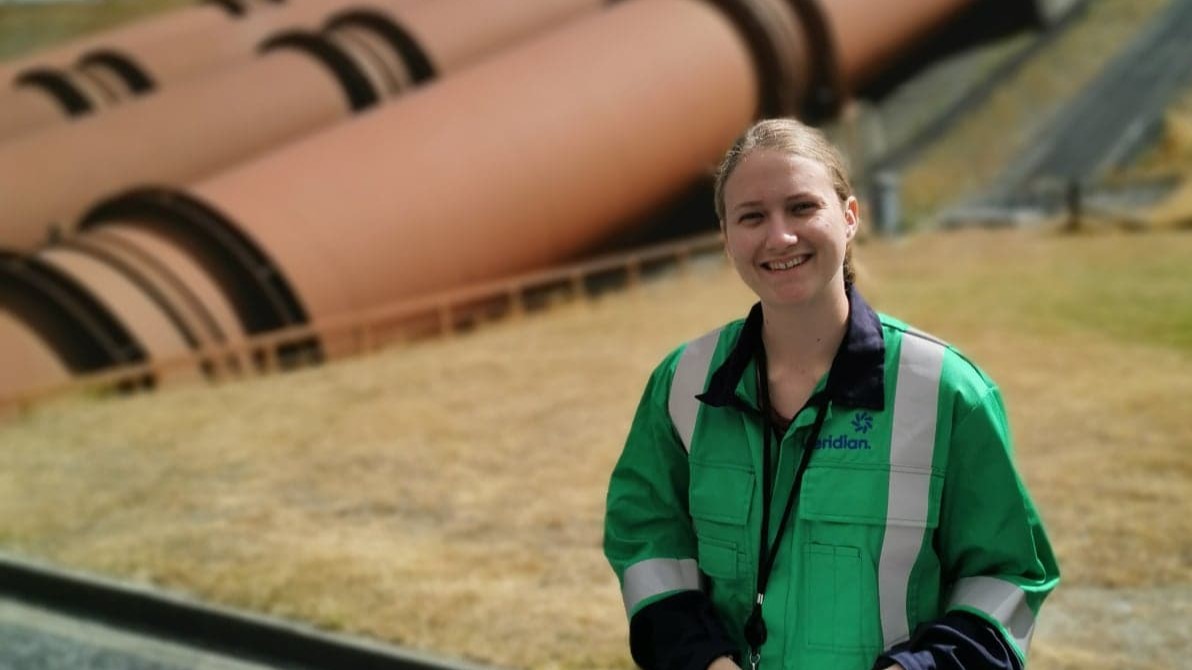For Emily Adams, a Product Development Engineer whose work taps into technologies that can help Kiwis play their part in lowering the nation’s carbon footprint, setting out on a path that would lead to a career at the cutting edge of sustainable energy generation with Meridian took a fair bit of courage.
She grew up in a large family in Taranaki. She loved Star Wars and had a natural talent for science at school. Her teachers spotted that talent, and nudged her down a study path that would lead to a career in engineering.
But there were barriers. At her high school “there was more money put into the home economics building than the science building,” quips Emily.
“If I wanted to learn HTML or that sort of stuff I would have had to go to classes at [a nearby boys’ school]. For a young girl that is extremely intimidating, so I didn’t actually take up the opportunity.”
But her teachers kept chipping away – and ultimately her decision to study engineering at the University of Canterbury came naturally enough.
“For me it was talking to the female science teachers at school. They were like ‘you know you could go into engineering’. That unlocked the possibility.”
From Canterbury, Emily joined Meridian as an intern and then graduate automation engineer based at the Waitaki Hydro Scheme.
In late 2021 she joined the company’s Energy Innovations team, which is tasked with developing smart technologies and implementing programmes to maximise the utility of renewable generation and storage.
Emily is currently leading a trial of bi-directional smart charging technology – which allows EV batteries to feed energy back into houses and the power grid.
The idea is to build ‘demand flex’ into the grid through the creation of virtual power plants that draw from sources such as EV batteries and domestic solar. Energy from these virtual plants can be utilised at times of high demand for the national grid, and be a fallback when renewable generation from weather-dependent sources such as solar and wind are lower.
In practical terms, an EV owner with a bidirectional charger could use their car battery to cook dinner and heat up the home, while also feeding the grid, and then top up the battery overnight when demand on the national grid is lower.
“Fun fact”, says Emily, “V2G [vehicle to grid] really became popular after Japan started investing heavily into it after the Fukushima disaster as car batteries proved useful for emergency response.”
For New Zealand, the technology could prove crucial in offsetting demand peaks created by a rapidly growing EV fleet – such as motorists all plugging in their EV chargers once they arrive home from work.
“That is a whole bunch of new load that if unmanaged would be a huge burden on the peak,” she says.
“Ultimately it will cost everyone more if that charging is unmanaged as we would have to overbuild our networks to manage just that one time of the day when the peak is huge.”
Hence, building ‘demand flex’ into the system is a key goal Meridian’s Innovations team. As well as transport, it is working on projects to tap into home and business solar, and replacing commercial coal boilers with electric alternatives that can be powered up or down to help manage the demand on the grid.
Emily says she has noticed a shift in attitude towards decarbonising technologies – even among those who might not be fully convinced of the threat and impacts of climate change.
“Ten years ago, talking about solar and EVs, people would be like ‘why are you even bothering?’
“But now the economic case is stronger, more people are seeing the benefits,” she says.
“Living more sustainably and having less reliance on importing fossil fuels is ultimately good for the country in the long run.
